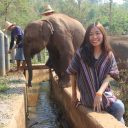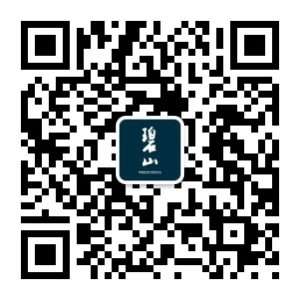In today’s world, a sense of calm is something to be admired. Talking to Zhang Mei, mother of three children, you can easily feel her composure and relaxed attitude.
Of course, being a mother is only one of her identities – important, but not the only one. She is also one of the board members of the Harvard Business School Alumni Association, a China expert on Travel + Leisure A-list, a veteran backpacker and a long-distance runner with 15 international marathon medals to her name.

Most recently, Mei went back to school for a PhD at the University of California, Berkeley. At the age of 50, with a successful family life and career, the question is why?
Mei answers the question with a smile: “It’s best to think about this question in reverse. Why not?”
This rhetorical question is a microcosm of her attitude to life, and serves as a timely reminder: the way we handle our relationship with the world and its surroundings informs how we manage our relationship with children and our attitude towards education.
From Small-Town Yunnan to Harvard
Mei’s own educational experience is legendary. Born to an ordinary family in Yunnan, her parents worked in a nearby power station. As a child, Mei lived in a workers’ hut on a hillside by the river.
After completing grade 3 at a primary school in Dali, she was educated in Kunming for more than 10 years before graduating from Yunnan University with a major in English and law.
Mei’s first mentor in her life was her father, who, despite only having an elementary school education, started work at age 13.
Her father taught her a lot in his own way. He was proud of his lifelong service as a worker. He may not have had a higher education, but his thirst for knowledge was strong, and he devoured almost all of the books in the local village library. He had a broad vision and encouraged his daughter to work hard at English and, as it would turn out, his advice was absolutely right.

Although Mei’s father was not able to help her with her homework, he was always generous with his support and company. Once, Mei accidentally lost her bicycle, which cost the equivalent of her father’s salary for a month. She felt so guilty that she could not bring herself to face him. Her father, however, didn’t scold her when he found out, but instead reassured her that the bicycle was just an object. She says that she’s still touched by her father’s ease and openness.
In 1994, Mei was accepted to Harvard Business School. The Harvard MBA program tends to only admit students with years of experience in business, but Mei, at just 23, was one of the youngest in her year. “It was an extraordinary moment,” she says, “I didn’t know my fate would intersect with Harvard until I got the offer.”
Before Harvard, Mei worked as a part-time translator for the president of a Thai bank. She did her job well and greatly impressed the bank’s president. One day, the president told Mei that he would like to “give a gift to the people of Yunnan” and support her with a scholarship to study abroad.
Mei was pleasantly surprised and, while she wanted to study Anthropology at first, the president recommended she pursue an MBA. She applied to one of the few American universities she had heard of at the time and not long after she was accepted by Harvard.

As for the reasons behind her unlikely admission, Mei recalls, “the application letter to Harvard is still fresh in my mind because it was so difficult to write.”
The brief called on applicants to explain the concept of business ethics using personal experience. After much deliberation, Mei finally opted for her one of her formative experiences at work.
Years earlier, she was placed in charge of a large laptop purchase for her company, a time when personal computers were still rare. She contacted the supplier and paid over 10,000 yuan for the machines. After getting a receipt, ready to go back, she noticed a rebate of 1, 600 yuan. Mei tried to return the money, but the supplier wouldn’t take it. She instead turned the money over to her company’s finance department because she felt she couldn’t live with the guilt of keeping it.
Mei’s monthly salary was just 160 yuan at the time. It’s not hard to imagine how much that extra money would have meant to her, but the importance of doing the right thing meant more.
The Three Tenets of Harvard and the Big Picture
Just this summer, Mei returned to Harvard to celebrate the 25th anniversary of her class’s graduation from the business school. After all these years, her alma mater still finds ways to surprise her.
“There was no ostentatious chitchat, not too much ceremony, just the most popular professors in the school returning to see our class. The two-day journey was simple but substantial, and comfortably arranged,” she recalls.

“I really admire Harvard professors because they still have an infinite amount of value to offer you at any given time,” Mei says, describing the school’s influence on its students as “imprinted for life”.
For a long time, the attraction of Ivy League schools has mostly been attributed to the aura that such elite institutions possess. Names like Harvard carry a certain gravitas. Mei, however, believes that these external perceptions are secondary to the actual knowledge taught in business schools like Harvard’s.
“Most importantly, Harvard gave me a completely different perspective on things. It has a huge impact not only on business, but also on future life choices.”
The fundamental takeaways for her mainly cover the following three aspects:
- An emphasis on business ethics
Harvard repeatedly and explicitly reasserts ethics, which are directly alluded to in the selection process.
- An emphasis on altruism
People may wonder how a business should value altruism when its main purpose is to make money from others. The key is that any business must serve people and solve problems to exist in the world. In other words, the businessperson is not only a moneymaker, but a problem solver in equal measure.
“This has to be done very well. If you make money just for the sake of making money, it tends to be small money. These gains are temporary and will never become larger,” Mei explains. - An emphasis on long-term thinking
From theory to practice, Harvard reminds students all the time: if you are going to do something big, you must think in the long term, and you must consider everything from a long-term perspective. Don’t try to make a quick buck.
Mei smiles before adding, “I had no such thoughts before, but my vision suddenly opened after I studied at Harvard.”
After graduating, Mei became more at ease following her own ideas and transforming them into action. She joined McKinsey, but didn’t find what she was looking for, so she quit and started backpacking around the world. It was on this journey that she experienced many defining adventures. One unforgettable episode took place in Tibet, where Mei reached the limits of her physical strength on the unforgiving slopes of the sacred Mount Kailash, only to be rescued by a Nepalese trekking group who offered her a tent.

In the end, she wound up back in her native land, where, after so many years away, she looked at her hometown again with an objectivity that enabled one of Mei’s great revelations. She realized that the richness of Yunnan’s natural and cultural resources could contend with any of the world’s top scenic spots, and that in its lack of international renown lay huge untapped potential.
In 2000, Mei founded WildChina to introduce China to the world in her own unique way, starting from her home province of Yunnan. It had the trappings of a standard travel business, but Mei never intended to follow a traditional path; instead, the focus of her enterprise was not really travel, but culture.
The global landscape created by consumerism is making cities and regions increasingly similar to each other. A ‘clocking-in’ style journey can never deliver the kind of cultural insights that make travel worthwhile. In the words of German philosopher Byung-Chul Han, “people walk through thousands of mountains and learn nothing; people look at things without forming any insight.”
For Mei, traveling is similar to reading a book. When embracing nature and approaching humanity from an environmental or anthropological perspective, the experiences she had during her travels tended to be more profound. When recruiting guides, she told them they didn’t have to memorize a script, instead encouraging them to tell stories about growing up in the area, about how their grandmother cooked or how their grandfather brought in the harvest.
Dali plums, for example, are a famous Yunnan specialty. Mei wants her WildChina guides to take guests to these plum orchards so they can see and learn how to pick the fruit, how to make a preserve and how to brew plum wine. But, most importantly, she wants them to see what life is like in these areas – how the people involved in this industry live.

By establishing a deep cultural link between the traveler and the destination, Mei has pioneered the world of quality travel in China and WildChina has been named one of the “Best adventure travel companies in the World” by National Geographic.
Yet despite such accolades, Mei still feels there is more to learn. Not long ago, she began to rekindle that passion of her 20s by pursuing a career in anthropology and studying the ancient Tea Horse Road at the University of California, Berkeley. At heart, she is still the same intrepid young woman of many years ago.
When Nurturing Children Focus on Long-Term Investment
Compared with their mother’s early life in Yunnan, Mei’s three children have had an entirely different experience growing up. During their childhood the family has moved several times between China and the United States, with the kids attending a variety of different schools. In terms of identity, it’s hard to say exactly where they belong.
But in trying to determine which upbringing is better, Mei insists that it is too early to tell.
“There are definitely some drawbacks to the life they’ve lived, but on the other hand, they have gained a sense of ease with the world from it, and find it much easier to fit in wherever they go.”
On the first day of her PhD, Mei went to school together with her children. “I think maybe the most useful help a parent can offer is to show children that there are different choices in life,” she says.

The decision not to play the role of a parent whose life revolves around their children is, in a sense, very American, but Mei doesn’t think her approach to parenthood is entirely a product of the United States.
“At the very beginning of being a parent, I always intended to look at my own upbringing as a reference.” For a long time, she believed in a kind of ‘no pains, no gain’ philosophy – that only hard work and sacrifice can lead to success – which is indicative of a certain Chinese way of thinking.
Now, however, Mei believes that Sino-American education should be treated dialectically. For example, when a Chinese child learns Chinese, there is a lot of hard work required: it is difficult to learn the language to a high level without persistence and attention to detail. The same is true for math.
She doesn’t believe that this simple, hard-line approach would work in schools in the United States. Mei notes that in American schools, teachers often use the word ‘agency’, referring to the individuality and free will that each child possesses.

“To a large extent, this word represents the character of American education,” Mei says.
When it comes to raising kids, Mei agrees with this American approach and attaches great importance to the concept of agency. To illustrate this, Mei recalls the time her daughter asked if they could get another dog. Mei said no because they already had one dog, and it would be a lot of work to raise a second. At this point, most children would cry, complain or give up the idea altogether.
Mei’s daughter, however, took it upon herself to produce a nine-slide PowerPoint presentation detailing the benefits of getting a second dog, including the potential for the new pet to get along with the old one. It was just like a mini corporate plan.
The whole family got together and had a kind of meeting to discuss the proposal. Mei couldn’t help but laugh: this kid just has agency.
As her kids grew up, Mei gradually realized that the most important thing in parenting is for parents to maintain open communication with their children. Long-term trust between parents and children is vital.

“If your child tells you something, and you immediately shut it down the first time, then the next time they won’t say anything. Instead, I focus on keeping the lines of communication open,” Mei says.
This idea of open discourse is also reflected in an atmosphere of equality in their home. Friends from all walks of life visit the household and regardless of who they are, the children are welcome to sit with the adults and ask whatever questions they want. This is how Mei gives her children the opportunity to interact with adults on an equal footing.
In short, Mei says that her parenting-philosophy has three main points: giving children a clear direction, the right to make independent choices, and companionship and support.
Yet in parenthood, personal development advice can only be delivered through a sort of osmosis; setting targets is a fools errand. Should children born to Harvard-alumni parents have to aspire to attend an Ivy League school? For Mei the answer is clear: only if it’s something that the children want for themselves.

In her opinion, when children figure something out for themselves, there is no need to pressure them. As for whether they choose to go to elite schools like Stanford or Harvard, revered by everyone, or the kind of liberal arts colleges that few have heard of in China, she doesn’t think there’s much difference.
If it is something they are reluctant to do, children will likely lose just as much as they gain in the long term. Mei believes that what children could lose by following the wrong path in life cannot necessarily be replaced with the value added by Ivy League schools.
“If the energy, the passion, the enjoyment of the child is worn away by the end, it is not worth the loss,” she says.
Mei is also cognizant of the fact that not every child is suited to Ivy League institutions, and believes that not every child needs to make the same choices.
Her young daughter, for example, is obsessed with making clothes. She buys a lot of clothes from second-hand stores to re-tailor them and create them anew. Mei, rather than view the hobby as an unnecessary distraction from school, has been very supportive, and her daughter now runs her own website selling upcycled and redesigned clothes.

But is encouragement the same thing as indulgence? Mei answers this question with a different story.
She and one of her children used to practice tennis together at a court which required a five-hour round trip in the car. Despite the journey, she got the feeling that her child wasn’t taking the sport very seriously.
After a week or two, Mei sat down with them, calmly but seriously saying:
“I don’t want to make you feel bad, but I think the way you are practicing isn’t respectful of the time and effort involved in the trip. We don’t need to spend so much time on this if it’s not what you want.”
She offered her child two choices: either get serious about tennis practice or just play more casually nearby.
Mei emphasizes that it is necessary to give children the space to make their own decisions, but that they must also be taught what respect is. After this frank exchange, her child insisted they wanted to keep practicing on the faraway court, committing to work harder than before.

Mei believes that the methods involved in raising children are similar to those employed at Harvard Business School: long-term investment and thinking is key. In business, it’s not prudent to focus on small gains. In parenthood, similarly, do not focus on short term success.
Mei loves to travel by herself, but she also likes adventuring with her children. Travel is one of the best long-term investments you can make in life. It not only exercises your body and expands your horizons, but it helps you build relationships as well. More than 20 years ago, Mei took this concept and began cooperating with many schools in China on education tours.
“My biggest investment in life is traveling with my children,” Mei says. It doesn’t need to be a coach tour or luxury cruise – it doesn’t even need to cost much. For Mei, even hiking a few kilometers outdoors with her children is enough.
Her favorite way to travel is with each child, one at a time. “In this way you don’t spend all your time managing logistics or catching flights. Traveling is about slowing down and making memories together,” she says.
In April, Mei traveled to Greece with her young daughter. Her daughter wanted to swim in the Mediterranean, but Mei thought it was too cold at this time of year. In the end, she decided to swim with her, and after warming up in the water she realized it was a paradisiacal spot. Mei thinks that moments like this demonstrate that the influence of parents and their children on a journey is reciprocal; when both get out of their comfort zone, the rewards are great.
Traveling can also brings the intangible to life. Her daughter had studied Greek politics and economics in school, but she didn’t have many relatable experiences of Greece itself.
“When she saw the olive trees all over Greece, the contents of the books suddenly came to life,” Mei explains.

A friend of Mei also acted as their guide on the trip, telling them about Homer’s great epics as they hiked the slopes of the ancient country. With the mythic scenery before them, Mei’s daughter turned to her, and said “Mom, when we get home, let’s read the Odyssey again!”
The things Mei’s daughter saw and heard during this trip boosted her interest in learning. Furthermore, the experiences found in travel serve as the best forms of aesthetic education. The spectacular, real-world scenery of a hike is as stimulating as viewing the paintings of Picasso or hearing the music of Beethoven.
Mei sought to impress the value of their experience on her daughter: “remember how beautiful this scene is now, and when you encounter difficulty in life, you can always remember that there is more beauty waiting for you in the world.”







